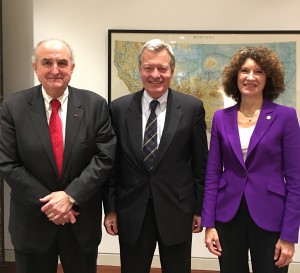Continuing IU’s China connection and meeting the global needs of IU students
A cold front blew through Beijing this morning, meaning the temperatures outside finally would match the many Christmas decorations adorning our hotel and the various places we’ve visited.
The weather change also provided members of IU’s delegation with an extremely rare clear view of Beijing’s skyline, as the shifting winds swept out much of the thick and dangerous smog that typically envelops the air here. (Upon our arrival, Beijing’s color-coded air-quality monitor signaled a dark purple, or “very unhealthy,” just one notch above “hazardous.” Remarkably, today’s readings turned up green, or “good.”)
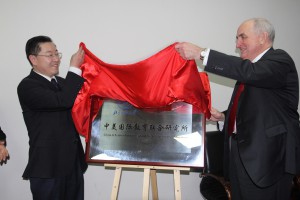
Beijing Normal University Vice President Zhou Zuoyu and IU President Michael A. McRobbie unveil a plaque commemorating a new partnership between their respective institutions, the China-U.S. Joint Research Academy for International Education.
The scene above the bustling streets of Beijing, the world’s third-most populous city at more than 20 million people, includes an impressive array of skyscrapers, several of which stand among the tallest in the world. Among them are such awe-inspiring architectural marvels as the new CCTV Headquarters, which the locals refer to as “Big Pants” (many of China’s biggest buildings have quirky colloquial nicknames that, as it turns out, are fairly accurate descriptors); Beijing National Stadium (“The Bird’s Nest”), which was built specifically for the 2008 Summer Olympic Games; and the National Centre of the Performing Arts (“The Giant Egg”), with its ellipsoid dome of titanium and glass.
Many of the city’s most magnificent structures were designed during recent building booms in Beijing that have come to reflect the remarkable political, economic and cultural transformation this country, one of the cradles of the world’s civilization, has undergone over the better part of the last half century.
Since the introduction of major economic reforms in 1978, which moved the country toward a more market-based economy, relying largely on investment- and export-led growth, China has become one of the world’s fastest-growing major economies on the planet. China also continues to invest heavily in higher education to enhance the quality and competitiveness of its universities and in academic research with the goal of further accelerating the country’s growth.
Perhaps not surprisingly, given China’s emphasis on innovation and its ever-expanding influence in world affairs, Indiana University students are increasingly turning their attention to cities like Beijing and elsewhere in China as they consider overseas study opportunities that will best prepare them to meet the challenges of a 21st-century global marketplace. In fact, in just the past decade or so, our students’ interest in studying in China has risen from a relatively low level to where China now ranks among the top five places they want to travel. Consequently, IU has focused increasing attention on developing strong and meaningful institutional partnerships with the top universities here, which have resulted the establishment of a number of successful student exchange programs and dual degree programs.
Pathways to productive global partnership
As part of a continuation of this core part of the university’s international engagement mission, IU President Michael A. McRobbie began the day with an early morning meeting with Chinese Minister of Housing and Urban-Rural Development Chen Zhenggao. The ministry provides housing and regulates government construction activities in the country, including a number of new initiatives to improve China’s roads and energy supply.
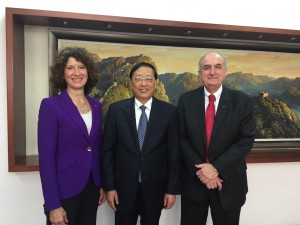
IU President McRobbie and Laurie McRobbie with Chen Zhenggao, minister of Housing and Urban-Rural Development in China.
Then, McRobbie and members of IU’s delegation made their way to the northwest section of downtown Beijing for meetings with senior administrators and faculty at Beijing Normal University, one of China’s oldest and most prestigious universities.
IU and BNU have enjoyed a nearly decade-long successful collaboration, involving both the IU School of Education and the IU Lilly Family School of Philanthropy, two of the university’s most globally engaged schools, that has generated numerous faculty and student exchanges and research collaborations.
Today, McRobbie and Zhou Zuoyu, vice president of BNU, formalized the partnership between the universities by signing a new primary agreement between the School of Education and BNU’s Institute of International and Comparative Education. The agreement calls for the creation of a new China-U.S. Joint Research Academy for International Education, and it also lays the groundwork for a more extensive set of partnership research activities between the two universities in the area of comparative education, as well as in math and science education, higher education administration and language education.
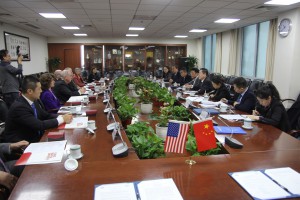
Members of the respective delegations from IU and Beijing Normal University met to discuss ways to expand upon a productive decade-long partnership.
McRobbie was quick to credit the late IU School of Education professor Heidi Ross for serving as the driving force behind the latest phase of the IU-BNU partnership. Ross, who passed away this year, wrote and researched extensively on developments in Chinese education, gender socialization and environmental education in Chinese schools, often working alongside her colleagues at BNU, and she was a powerful advocate for greater numbers of students and faculty working in China. She also served as director of IU’s East Asian Studies Center and co-directed the Australian National University-IU Pan Asia Institute, part of IU’s School of Global and International Studies, since the institute’s founding in 2009.
The trip to Beijing Normal University also offered leaders from both universities, including BNU President Dong Qi, a chance to talk openly about other opportunities to expand upon their partnership, which IU Vice President for International Affairs David Zaret described as one of IU’s “most active and rapidly growing relationships.”
IU and BNU possess common strengths in, among other academic disciplines, the arts and humanities, the social and natural sciences, and law, and they share similar goals regarding global engagement and finding ways to help more students study abroad before they graduate.
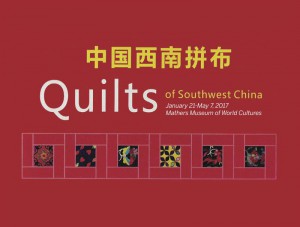
A groundbreaking exhibition on the Quilts of Southwest China is one of the many highlights of IU Bloomington’s upcoming “China Remixed” festival.
It was especially interesting to learn, for example, that BNU, like IU, owns its nation’s top-ranked program in the study of folklore. Likewise, it was heartening to hear that IU’s counterparts here in the humanities are equally interested in growing greater cultural awareness among their students through activities like the upcoming showcase of the Quilts of Southwest China at IU’s Mathers Museum of World Cultures, which will be co-curated by an IU student who earned a Master of Arts at BNU. The exhibition is just one of the many events and activities that will highlight IU Bloomington’s “China Remixed” festival. The festival, to occur over 10 weeks in the spring and feature several celebrated Chinese authors, artists, musicians and others, is designed to reflect all of the ways the arts and humanities of China affect IU and, in turn, how IU engages with those same areas.
Fulfilling the promise of an international education
Members of the delegation concluded their final hours in Beijing with a meeting in the office of U.S. Ambassador to China and former U.S. Senator Max Baucus.
The hourlong conversation covered a wide range of topics, including the ambassador’s observations of the current state of higher education in China and how U.S. colleges and universities might ensure more students pursue immersive study abroad experiences in China. The former Montana congressman also recounted his own experience as a young college student taking a year off school to backpack around the world, which sparked a lifelong interest and successful career in international affairs, and he even professed his adoration of the popular Chinese messaging app WeChat.
For his part, and at Ambassador Baucus’ urging, President McRobbie shared his impressions of Chinese students who come to study at IU, the impact IU has on them, the dreams they often achieve while at the university and the positive message they spread about their alma mater and America when they return to their home countries.
To this end, I leave you — and the great city of Beijing — with a video of spring’s IU Bloomington student commencement speaker. She is Grace Boya Shen, the first Chinese student to serve in this capacity at IU’s annual spring graduation ceremony. She gave a wonderful speech about her journey as an international student, which brought her halfway across the globe from her home city of Beijing to Bloomington, Ind.
“IU turned my small dream into a bigger dream,” she says in the video, which I encourage you to watch. “It’s a dream that we all share: to make this world a better place.”
Thanks for reading, and see you tomorrow in Shanghai!
Tags: Beijing, Beijing Normal University, China, China Remixed, David Zaret, Grace Boya Shen, Heidi Ross, IU Lilly Family School of Philanthropy, IU Mathers Museum of World Cultures, IU School of Education, IU School of Global and International Studies, Max Baucus, Michael A. McRobbie, U.S. Ambassador to China



